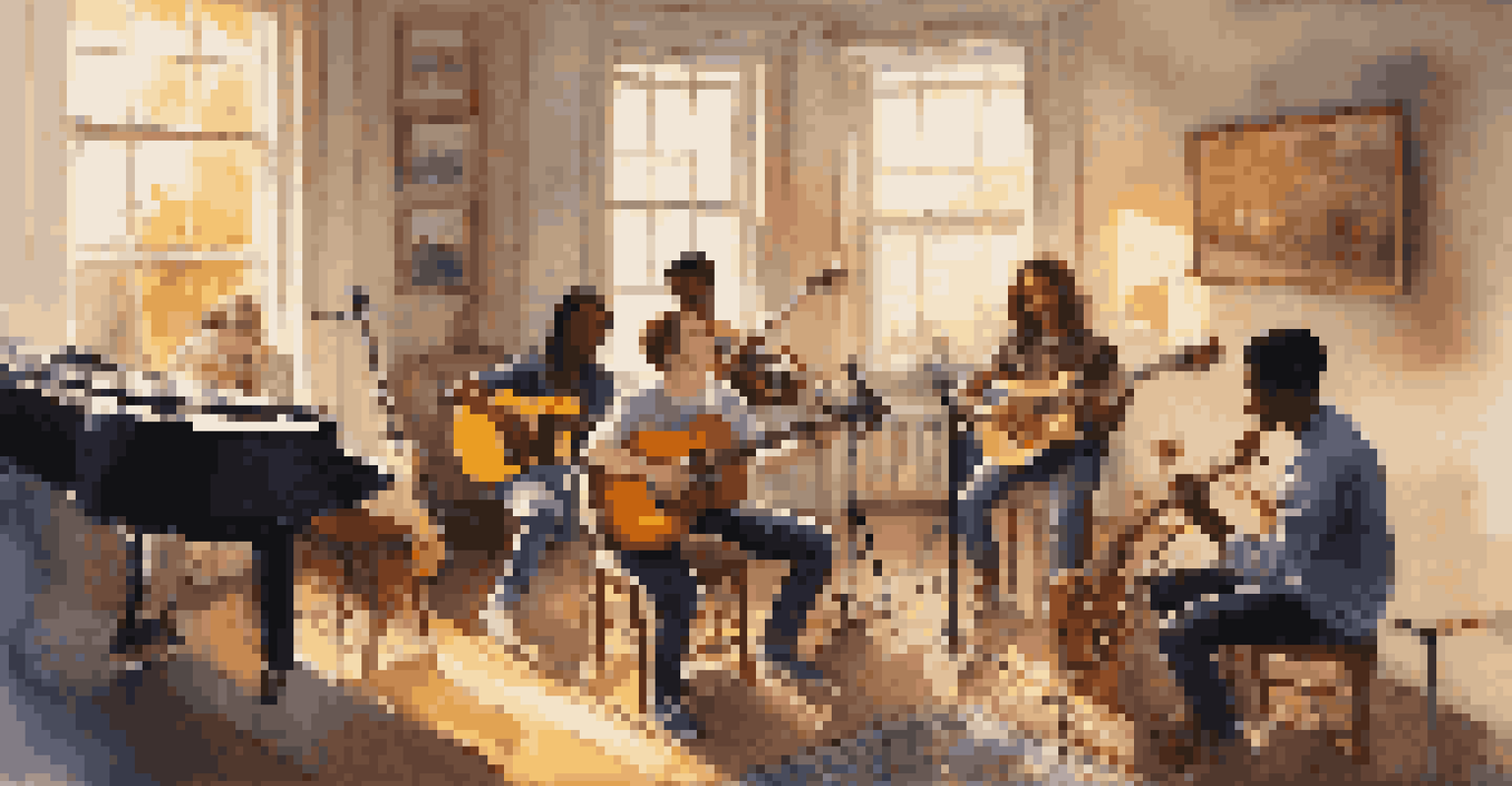The Role of Music in Shaping Youth Community Engagement

Understanding Youth Community Engagement Through Music
Music serves as a universal language that resonates with young people, often acting as a bridge to community engagement. When youth participate in musical activities, they not only express themselves but also connect with others who share similar interests. This shared passion can lead to a greater sense of belonging and commitment to their community.
Music can change the world because it can change people.
For many young people, music is more than just entertainment; it’s a powerful tool for social change and self-expression. Through genres that reflect their experiences, youth can voice their concerns and aspirations, making it easier for them to engage with community issues. This process fosters a deeper understanding of their environment and encourages proactive involvement.
Moreover, music-related events can act as catalysts for community gatherings, bringing together diverse groups of people. Whether it's a local concert, open mic night, or community festival, these events create opportunities for young individuals to engage, network, and collaborate on various initiatives that benefit their neighborhoods.
The Role of Music Education in Community Engagement
Music education programs play a vital role in nurturing youth engagement in communities. By providing young individuals with the skills to create and appreciate music, these programs empower them to participate actively in their local culture. When youth learn to play instruments or participate in choirs, they gain confidence and a sense of accomplishment that translates into community involvement.

In addition to skill-building, music education fosters teamwork and collaboration. Students who participate in bands or orchestras learn the importance of working together towards a common goal, which can easily extend to community projects. This collaborative spirit is critical for engaging young people in initiatives that address community needs.
Music Unites Youth in Communities
Through musical activities, young people find a sense of belonging and actively engage with community issues.
Furthermore, music education often includes exposure to various cultural traditions and genres, promoting inclusivity and understanding. As young individuals discover different musical styles, they develop an appreciation for diversity, leading to more engaged and empathetic community members.
Community Events: Bringing Youth Together Through Music
Community events centered around music, such as festivals and concerts, provide excellent platforms for youth engagement. These gatherings not only allow young people to showcase their talents but also encourage them to participate in the planning and execution of events. This involvement fosters leadership skills and a sense of ownership in their community.
The power of music makes all the difference in the world; it can heal, inspire, and connect us in ways that nothing else can.
Additionally, these musical events often attract a wide audience, creating a vibrant atmosphere for interaction. Young people have the opportunity to meet peers from different backgrounds, fostering connections that may lead to collaborative efforts. Such relationships can inspire initiatives aimed at improving their communities.
Moreover, community music events often highlight local issues, creating awareness among youth. For instance, a concert for a cause can spark discussions about social justice, environmental concerns, or mental health, encouraging young individuals to become advocates for change.
Music as a Tool for Social Change in Youth Engagement
Music has a long history of being a catalyst for social change, and youth are often at the forefront of these movements. Through songwriting and performance, young people can address social issues, mobilizing their peers to take action. This ability to influence change is a powerful motivator for engagement in the community.
Examples abound of youth-led musical initiatives that have made significant impacts, such as campaigns against bullying or for climate action. By using their artistic voices, young individuals not only raise awareness but also inspire others to join their cause, creating a ripple effect of engagement.
Education Empowers Youth Engagement
Music education fosters skills and teamwork, encouraging young individuals to participate in community initiatives.
Furthermore, music allows for creative expression, which is crucial for youth navigating complex societal issues. Engaging in songwriting or performance can provide an outlet for emotions and thoughts, encouraging young people to channel their feelings into positive actions that benefit their communities.
The Influence of Social Media on Youth Music Engagement
In today's digital age, social media plays a pivotal role in how youth engage with music and their communities. Platforms like Instagram, TikTok, and YouTube allow young individuals to share their musical talents and connect with audiences beyond their local areas. This exposure can motivate them to become more involved in community events and initiatives.
Moreover, social media acts as a powerful tool for organizing and promoting music-related activities. Young people can collaborate online to create events, share resources, and rally support for causes they care about. This sense of community in the digital space often translates into real-world engagement.
However, it’s essential for young individuals to balance their online presence with offline activities. While social media can amplify their voices, nothing replaces the impact of face-to-face interactions in fostering genuine community connections. Encouraging youth to take their online engagement into the real world can lead to more meaningful involvement.
The Psychological Benefits of Music on Youth Engagement
Participating in music can provide significant psychological benefits to young individuals, which in turn can enhance community engagement. Activities like playing an instrument or singing in a group can boost confidence, reduce stress, and foster a sense of belonging. These positive effects can motivate youth to become more active participants in their communities.
Additionally, music has the power to evoke emotions and create shared experiences, making it a valuable tool for building connections. When young people engage in music together, they share not only the joy of creation but also the challenges, fostering camaraderie that can lead to collaborative community efforts.
Social Media Amplifies Musical Impact
Online platforms enable youth to share their music and organize events, bridging digital engagement with real-world connections.
Furthermore, music can serve as a therapeutic outlet for addressing personal and collective struggles. By engaging with music, youth can explore their feelings in a safe space, leading to emotional resilience that empowers them to tackle community challenges head-on.
The Future of Music and Youth Community Engagement
As society continues to evolve, the role of music in youth community engagement will likely grow in importance. With the rise of technology and new platforms for creation and collaboration, young individuals have more opportunities than ever to express themselves and connect with others. This evolution could lead to innovative ways of engaging with community issues.
Moreover, the increasing emphasis on mental health and well-being in society highlights the importance of music as a supportive tool for youth. As communities recognize the role of music in fostering engagement, they may invest more in programs that promote musical activities, ensuring that young voices are heard.

Ultimately, encouraging young people to harness the power of music in their community engagement can lead to a brighter future. By nurturing their talents and passions, we can empower the next generation to create a more inclusive, vibrant, and connected community.